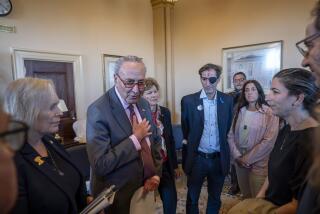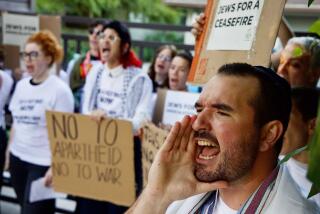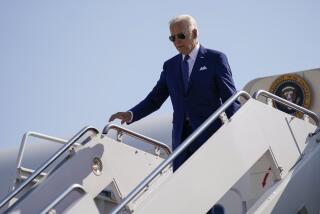Families Join In Push for Troops’ Return
- Share via
WASHINGTON — Military families frustrated with the long tours of duty for U.S. troops in Iraq have formed a campaign to urge an end to U.S. military engagement there and the return of troops to their home bases.
Parents whose children are stationed in Iraq unveiled the effort, dubbed “Bring Them Home Now,” at a news conference Wednesday in Washington. “It was wrong for the U.S. to invade Iraq, it is wrong for the U.S. to be occupying Iraq,” said organizer Nancy Lessin of Boston. “There is no right way to do a wrong thing.”
Last fall, Lessin and her husband, Charley Richardson, co-founded Military Families Speak Out, a group of about 600 families that oppose U.S. military action in Iraq. Their son Joe, 25, was sent there with the Marines in August 2002 and returned home in May.
Organizers of the Bring Them Home Now campaign, many of them wearing peace-symbol buttons, decried the Bush administration’s support of a conflict they said was unnecessary.
“This is a war that has been based on a series of lies, a war based on posturing on the deck of a carrier and from the safety of the White House,” Richardson said. He and others said Iraq posed no immediate danger to the United States, and they criticized the government for not uncovering weapons of mass destruction or links between ousted Iraqi leader Saddam Hussein and the Al Qaeda network responsible for the Sept. 11 attacks.
But a Pentagon official said the group’s indictment of the U.S. military effort does not reflect most Americans’ views.
“Our hearts go out to anyone who’s lost a loved one in Iraq or whose loved one is still in harm’s way,” said Lt. Col. James Cassella, a spokesman for the Defense Department. “I think the best way to honor them is to accomplish the mission which they sacrificed so much to achieve.”
The group is “clearly out of step with the vast majority of service members, military families and veterans who understand we can fight and win the global war on terrorism in places like Iraq or we can lose it in the streets of America,” Cassella said.
About 146,000 troops are in Iraq, said Capt. Jeff Sandrock, a spokesman for U.S. Central Command in Tampa, Fla. Since March 19, 267 American troops have been killed and 1,009 wounded in Iraq, according to Defense Department figures. Of those deaths, 129 occurred after May 1, when the war was officially declared over.
The American Legion, a 3-million-member veterans group, backs military action in Iraq, said spokesman Steve Thomas. “Everybody wants the troops to come home,” Thomas said. But “the troops themselves know they have to get a very important job done in southwest Asia; they have to complete their mission.”
But some troops’ relatives said Wednesday that the mission was misguided from the start.
Fernando Suarez del Solar of Escondido was visibly shaken as he spoke tearfully of his son, Marine Lance Cpl. Jesus A. Suarezdel Solar, who was killed in Iraq on March 27, one of the first American casualties. “I ask President Bush: How many sons do you need ... [before we] bring our children home?” he asked. “How many American lives are worth one gallon of oil?”
“Many [Latinos] are afraid to speak out against the war,” Suarez said. “They think Immigration is going to deport them. I know many Hispanic families that have sons in the war who oppose the war, but don’t say anything.”
Bring Them Home Now has received thousands of supportive e-mails from a cross-section of people around the nation, Richardson said. Many of those people have contacted members of Congress to protest military action in Iraq, he said. However, others have e-mailed the group to condemn its efforts as unpatriotic.
Richardson defended the group’s examination of the justifications for the U.S. military presence in Iraq. “We have to ask the questions; we have to challenge the powers that be,” Richardson said. The group’s name is a play on a comment made by President Bush last month to “bring ‘em on” in reference to Iraqi guerrilla attacks on U.S. troops.
But the group does not speak for all military families, said Kathy Moakler, a deputy director for the National Military Family Assn., an advocacy organization. “We have not received call one from a military family that said, ‘Bring our folks back,’ ” Moakler said.
Still, members of Bring Them Home Now hope the nation’s politicians hear their message. The bottom line, Lessin said, is reuniting families.
“Bring them home and stop the toll of death and injury and illness,” she said.
More to Read
Sign up for Essential California
The most important California stories and recommendations in your inbox every morning.
You may occasionally receive promotional content from the Los Angeles Times.













